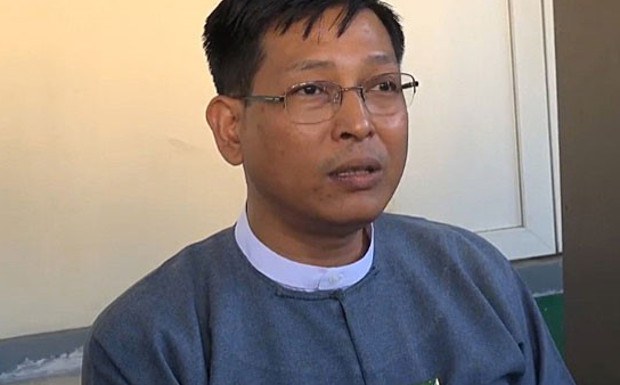Myanmar’s Aung San Suu Kyi to Skip UN Meeting Due to Violence in Rakhine
2017.09.13
 Myanmar government spokesperson Zaw Htay is shown in an undated photo.
Myanmar government spokesperson Zaw Htay is shown in an undated photo.
Myanmar leader Aung San Suu Kyi will not attend the annual U.N. General Assembly meeting in New York this month because of pressing security and humanitarian concerns in her country’s northern Rakhine state, a government spokesperson said today.
The de facto national leader, whose official titles are state counselor and foreign minister, will send Myanmar’s vice president Henry Van Tio to New York in her place so that she can better focus on calming the situation in Rakhine, spokesperson Zaw Htay said
Nearly 380,000 mostly Muslim Rohingya residents of Rakhine have fled to Bangladesh in the wake of Aug. 25 attacks against Myanmar border police posts by an Islamic insurgent group, with about 1,000 people killed in subsequent clashes and security sweeps by the country’s military, according to U.N. estimates.
Of 471 Rohingya villages in three townships in Rakhine, 176 are completely empty, with about 34 others partly deserted, Zaw Htay said, using the pejorative term “Bengali” to describe the Rohingya, who are widely viewed in majority-Buddhist Myanmar as illegal immigrants from Bangladesh, though many have lived in Myanmar for generations.
Myanmar’s handling of the crisis and perceived persecution of the Rohingya have drawn sharp international criticism, with Bangladesh accusing Myanmar forces of carrying out a “genocide” against the officially stateless Muslim minority group.
The U.N. Security Council was slated to hold a closed-door meeting on Wednesday, its second such meeting over the Rakhine crisis.
U.N. Secretary-General Antonio Guterres on Wednesday described the humanitarian situation in Myanmar as "catastrophic," and called on Myanmar’s army to end the violence and other countries to do what they can to supply aid, Reuters news agency reported.
"I call on the Myanmar authorities to suspend military action, end the violence, uphold the rule of law and recognize the right of return of all those who had to leave the country," Guterres said at a news conference.
A different view
Members of Myanmar’s 88 Generation Students group of 1988 democracy activists, however, underscored the starkly different view of the crisis held by many in Myanmar.
Media reports on the crisis in Rakhine have been largely one-sided, members of the group told BenarNews sister agency Radio Free Asia’s Myanmar Service following a trip to Rakhine’s Maungdaw township to help deliver supplies to residents in need.
“The media should write about the situation of all who are in danger,” group member Nilar Thein said.
Ethnic groups other than the Rohingya are also suffering in the region, she said, asserting that news reports have said nothing or little about their plight.
“I would ask local and foreign-based media to fairly present the facts,” she said.
The world’s view of what is happening in Rakhine has been shaped by the media’s “reporting the situation in whatever way they like,” former student activist and 88 Generation member Min Ko Naing said.
“To present a complete picture, the media must be involved, but it should do its work free from pressure and bias,” he said.
Committee formed
Myanmar’s president Htin Kyaw, now undergoing medical treatment in a hospital in neighboring Thailand, has meanwhile formed a committee to implement recommendations put forward by a commission led by former U.N. secretary general Kofi Annan to examine the causes of unrest in Rakhine.
The nine-member Advisory Commission on Rakhine State, appointed by Aung San Suu Kyi in August 2016, has called for reviews of the country’s citizenship law and for an end to restrictions on the Rohingya in order to prevent further violence in the beleaguered region.
“We will look at all the available facts on the ground and deliver programs to meet the needs and desires of the people,” said Union Minister for Relief and Resettlement Win Myat Aye, appointed to lead the committee, which will publish reports on its findings every four months.
“As we are going to employ personnel from various government departments, we will be able to work together cohesively,” Win Myat Aye said.







